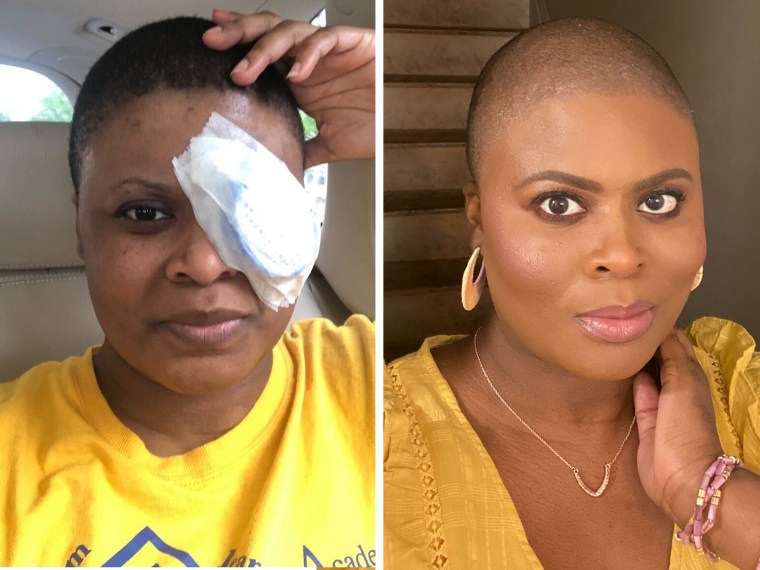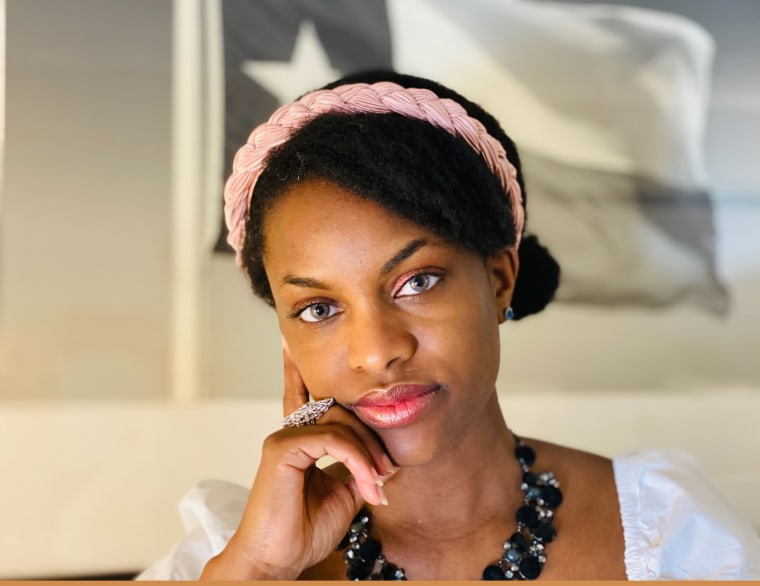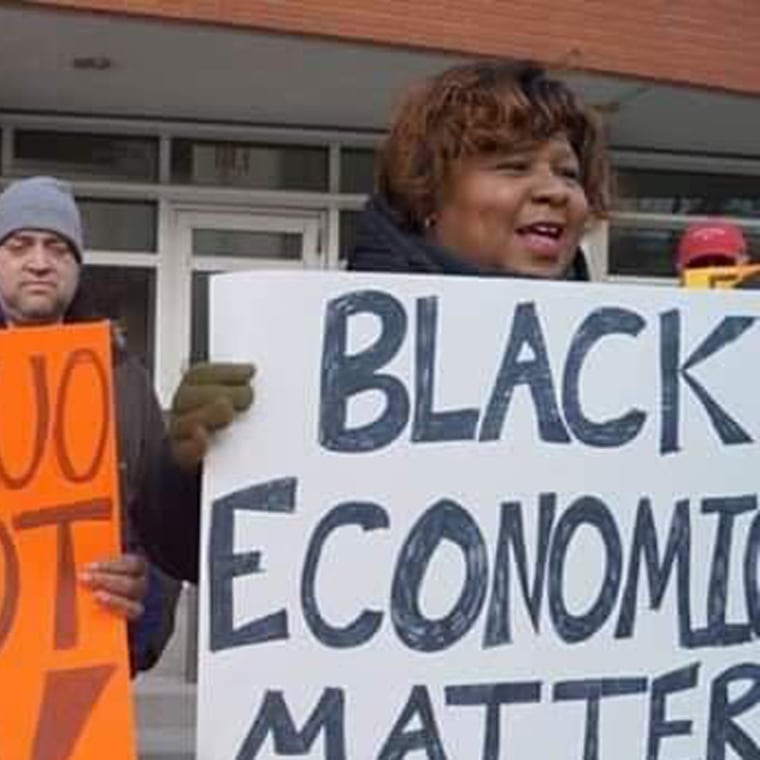Black Covid long-haulers felt invisible to the health care system, so they formed their
Chimére L. Smith, 40, thought her bout with Covid in March 2020 would pass within two weeks, as most mild cases do. But the Baltimore English middle school teacher found herself continuously experiencing extreme fatigue, diarrhea, dry mouth, brain fog and a sore throat, which she initially attributed to a possible sinus infection. By April, she couldn’t work or drive, had lost 30 pounds, had spinal pain and lost complete vision in her left eye. She even thought about taking her own life. Smith was experiencing long Covid.
Smith said she visited hospitals a dozen times seeking help, but the physicians brushed her off, and one doctor labeled her “aggressive” when she insisted that severe headaches she experienced were due to Covid. She said she was repeatedly discharged with no resolution after each visit.
“I would come in with notes of my symptoms and share these symptoms with these doctors and they would not hear me. They wouldn’t listen to me. They would treat me as if I was a child and I didn’t know my body,” Smith said. “I wanted to die because I could not eat. I could hardly drink. I couldn’t think. Everything that I knew about my life within those first two or three months had been destroyed.”
That’s when Smith found the BIPOC Women Long Covid ‘Long Hauler’ Support Group, a Facebook group with hundreds of women of color with long Covid who meet virtually. Since joining the group in May 2021, Smith said she has been better equipped to advocate for her own care and that of Black women living with prolonged symptoms of the virus. She’s one of many Black people across the country suffering from long Covid who have found solace in communities of people having the same experience. Similar support groups have popped up in many states since the pandemic began, with Black people uniting to tackle everything from lingering symptoms to disparities in the nation’s health care system.

Long Covid — or post-Covid — was first identified in the U.S. in the months after the pandemic began in March 2020. And now, two and a half years into the public health crisis, a lot remains unknown about the prolonged illness that affects up to 23 million Americans. Symptoms of long Covid vary from person to person, with people reporting experiencing everything from fatigue and cognitive impairment to tissue damage and organ injury, according to the U.S. Government Accountability Office. Like most of the pandemic’s fallout, Black people are bearing the brunt of long Covid, with the group making up a majority of long Covid hospitalizations and researchers even projecting that Black people’s life expectancy will drop significantly in the next five years as a result. As a way to counter the troubling data, Black people have formed these support groups in hopes of making sense of the illness and to find the help they need.
“I am very proud to be a part of that group,” Smith said of the Facebook community. “As a matter of fact, that group is where I now spend a lot of my time because we become family, because we all share the same experiences.”

Dr. Margot Gage Witvliet, a social epidemiologist and assistant professor at Lamar University, created the support group Smith is a part of in July 2020 after struggling with her own prolonged Covid symptoms. Witvliet, 40, contracted Covid in March 2020 and spoke about her experience in a TED Talk. She told NBC News that her husband and two children also contracted the virus, but her symptoms were the worst. She said in the TED Talk that she had trouble breathing and even suffered a seizure. Witvliet, who lost her grandmother to Covid, said she is just happy to be alive. Witvliet still endures chronic pain, fatigue and neurological issues, including short-term memory loss. Like Smith, Witvliet said doctors dismissed her symptoms and “infantilized” her. She said, on one occasion her glucose levels rose, which she believed to be a result of the virus, and a doctor told her to stop eating fried foods. In another incident, Witvliet was rushed to the hospital for a seizure, and was attended by a physician who asked if she had used drugs, she said. “I was not treated with dignity,” she said, adding that on one occasion her husband, who is white, accompanied her to an appointment. And the doctor would only address him. “Yet, I am the one who is a health expert with a PhD and I am not a child.”
After hearing multiple women of color share similar stories of seeking treatment for their long Covid symptoms, Witvliet decided to create a safe space where their voices could be heard.
“I wanted to be able to use the fact that I was a professor and a social epidemiologist to really help these women who were suffering,” Witvliet said. “So that’s what this group has done. And I’ve met some really phenomenal women, and we have lasting friendships in this group because we’re all unified by this trauma that’s happened to us.”
The Facebook support group has nearly 400 members, all women of color, and they discuss ways to monitor and alleviate their symptoms, and speak with doctors about long Covid diagnoses. Witvliet also invites experts to discuss self-care and health challenges related to Covid. As for Smith, who is an active member of the group, she said she helps members file paperwork to claim disability benefits because many group members are rejected. (As of July 2021, long Covid is considered a disability under the Americans with Disabilities Act.)
Barriers to long Covid care
Although there is no official test to diagnose long Covid, Dr. Sabrina Assoumou, an infectious diseases physician at Boston Medical Center, said that doctors look for symptoms like prolonged fatigue, cognitive dysfunction, shortness of breath and “lingering pulmonary symptoms” to determine whether a person is experiencing long Covid. She added that the same structural racism that makes Black people more susceptible to Covid than other groups are the same inequities that create barriers to receiving long Covid treatment. These barriers include, inadequate health insurance coverage, lack of access to long Covid resources and lack of primary care doctors.
Assoumou praised these long Covid support groups and provided advice for the communities as they navigate the illness and medical racism. She recommends that the group learn about the symptoms and long Covid definitions provided by the Centers for Disease Control and Prevention and be sure to document their experiences.
“Sometimes it can be overwhelming when you go see a doctor,” Assoumou said. “Take good notes and write down your symptoms over a certain period of time so when you’re in the office with the doctor you have your information ready and organized. Document your own history in your own words,” Assoumou said, adding that patients should prioritize long Covid clinics over general hospitals or urgent care centers.
“Inquire about these multidisciplinary clinics that help streamline things because they’re like one-stop shops where you get to see multiple specialists. It’s helpful for these groups to know these clinics exist and are available.”
Another leader helping the Black community navigate their long Covid symptoms is Yvonka Hall, executive director of the Northeast Ohio Black Health Coalition. Hall, 54, said some of her relatives contracted Covid and endured severe symptoms, like her uncle, who lost an arm as a result of blood clots, and her niece, who required emergency surgery due to a bowel obstruction. Hall contracted Covid in February 2020, before the vaccine was available in her predominately-Black Cleveland community, and said that she still struggles with brain fog, stomach issues and joint pain as a result of the virus.

In March 2021, Hall started a support group of about 10 members who continue to meet virtually for one hour each month. Hall’s group exists under the Northeast Ohio Black Health Coalition, a social justice organization Hall founded in 2011. Similar to Witvliet’s group, members can hear from experts who help them learn how to manage their symptoms and answer questions.
“When we get finished at the end, you can see some of the looks on people’s faces,” Hall said, “where it looks like a heavy burden has been lifted.”
Hall documented the group’s experiences with Covid in a documentary called “Black COVID, ‘The RONA.’” One member, Joncquil Hope, 38, of Campbell, Ohio, said she joined Hall’s support group earlier this year after contracting Covid in December. She said she suffered headaches, fatigue and brain fog, and still struggles with her memory. In the group, she’s able to openly discuss her symptoms while learning about new ones that may occur.
“It’s nice, because not only can we hear from people who may have experienced…
Read More: Black Covid long-haulers felt invisible to the health care system, so they formed their

